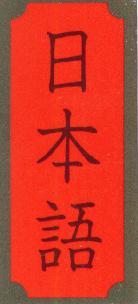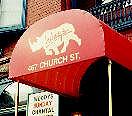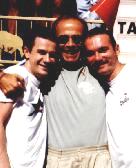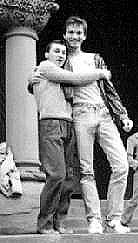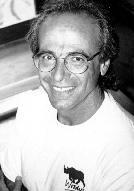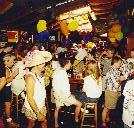|
Promiscuous Affections A Life in The Bar, 1969-2000
1987-1991:
|

There nearly every day: Princess Margaret Hospital (as it was, since moved); the Wellesley Place entrance, our usual on visits to Michael Wade. |
I was rarely fraught there, Mikey & I long resolved & well. When he was anxious about a lung tap, confused by his IV tubes, I could calm him. Sara said I calmed him better than anyone.
But, oddly, being there with him calmed me.
1990
April through December
A few weeks after I got back to Toronto, Michael Wade was back in Wellesley Hospital. He had an infection in one leg, a small lump at the back of the knee. It seemed minor, maybe a blood clot, maybe cellulitis.
On Friday, April 22 it was diagnosed as lymphoma, the only treatment chemotherapy. With that news, Michael was released for the weekend.
I visited him in a new place and with a new lover, David Weir. Mikey had left Douglas again, messily, a few months before. David was a sweet, handsome bear of a man, an architect. So now Mikey was interested in architecture, researching Toronto's '50s modern buildings and their creators.
But he had no energy for that now, back at Wellesley for three more days waiting for tests and the results of tests, all to assess the likely course of chemotherapy. He did start it, miserably, soon transferred next door to Princess Margaret Hospital, the biggest cancer treatment centre in the province.
On May 28 I visited him there, weak and angry, his face swollen, his breathing noisy. David was there. After an hour we left Mikey asleep, went outside and talked.
David told me Michael's symptoms weren't from chemo; it had been stopped 10 days before. His immune system was so knocked down that now he had something else, what no one knew for sure. His lungs kept filling with fluid, one already written off by his doctors.
When Mikey had been pondering chemo, he'd been told he would likely live no more than three weeks without it. He didn't tell me that; David did, there. So that was the prognosis now.
***
I was back at Princess Margaret nearly every day after that. Once at the nurses' station by Mikey's room I saw a middle aged couple, later introduced: Sandy and Chris Wade, his mother and father.
They had never met me before, eager not to, that man who had abducted their boy, then still in his teens. (They did later meet Douglas, and quite liked him.) Sandy asked Sara McCormack Prince, often there, who I was. "Rick," Sara said. "You know, before Douglas there was Rick."
A few days later she came into Michael's room, Sara, Douglas, David and I all there. She smiled. "So it's all the lovers, is it?" Sandy and I would get on well.
Douglas had come down from the farm earlier that week, here not only for Michael but to arrange the affairs of Peter Day, a well known curator, Craig Patterson's lover for a time and a friend of Michael's. They'd met in May 1982 at the "Immoral, Indecent and Scurrilous Dance Party," TBP's bash before the "Men Loving Boys" replay. In his journal, Mikey had captured the moment.
- I saw Ricky standing just at the edge of the dance floor and I went up to him and asked him: "Who is this guy I've been dancing with?"
"Oh, that's Peter Day. He works at the Mira Godard Gallery."
"Is he respectable?"
"Oh yes, he's written stuff for The BP."
They had left together, Peter impressed when at his apartment Michael identified the needlepoint he'd done on throw pillows as paintings: Lichtenstein, Lautrec, Matisse.
Peter later had a prolonged bout of mental instability, its cause neurological. Surgery had improved things but not for long. On May 28, 1990, no one having heard from Peter for a week, Craig Patterson went with police to his apartment where they found him dead. He'd left no note, but it was clearly suicide.
We hesitated to tell Michael about Peter's death, but in time did.
***
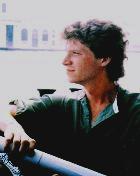
Michael Wade, 1960-1990 A photo given me by Mikey's mother after he died. Douglas Chambers later told me he'd taken it in the mid 1980s, in Venice. |
He died not yet 30 years old, angry he'd not become who he might have been. I'm glad he rests where he does, not as Douglas's lover, nor Sara's or David's or mine, but as Michael Christopher Wade.
Mikey at Stonyground
Michael Wade does not rest at the farm but he, like Peter Day, is memorialized there.
West of the barn, before a bench looking to the fields past a "ha ha" (a wall set into a hill, invisible from above; also one of Mikey's favoured sardonic bits), there is a plaque to him, set in the earth & inscribed: "O fortunatos agricolas" ("O happy countrymen").
Douglas has written: "The rest of Virgil's line, the uninscribed bit in parentheses, is 'si bona norint' ('if you but knew your happiness')" -- this his "memorial to the young classicist, dead at thirty, who first took a shovel in his hand here to start all this."
This & much else is described in Douglas's Stonyground: The Making of a Canadian Garden (Knopf Canada, 1996). Reading an unfinished draft at the farm the year before, I was surprised to find Michael not named among the many who had helped make the place. When I got the book I saw why: he couldn't appear casually. Douglas saved him for the end, the book's final evening:
"Maybe this garden, this landscape, is also another sort of parenthesis, a bracketing of something important from the chaos that surrounds it. Perhaps Wallace Stevens was right. Without what he calls 'the leaves of sure obliteration' that summer strews on our path, we would achieve nothing, never be moved to do so. But it is a hard lesson, this business of mortality that brings out the full sweet flavour of an evening like this one, with its trace of bitterness."
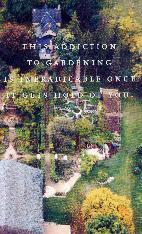
Stonyground: Douglas's farm (or a small part of it) on the back of Douglas's book, as seen from a balloon. Big roof the barn; the house at the top; potager centre right. Under the yellow maple blaze, Michael's bench & plaque. |
Of all of us, Douglas was most fraught when at the hospital, Michael still unresolved for him, as he was for Michael. I told him there was no point trying to work anything out now.
All that mattered was that he was there, Michael glad he was. He once brought pictures of the farm, showing his latest installations. I suspected Mikey might resent that, the farm another of Douglas's preoccupations not Michael. But he wanted to see those shots, and enjoyed them.
Still, it was very hard for Douglas. In time I said to him: "There's nothing wrong in not being able to deal with this here. It's all right. Just go home." He did.
I was rarely fraught there, Mikey and I long resolved and well. When he was anxious about another lung tap, fluid painfully drained through a needle in his back, or confused by his IV tubes, once getting them tangled up in his legs, I could calm him.
Sara said I calmed him better than anyone else. Maybe because, oddly, being there with him calmed me.
- To Jane Rule, Sunday, June 10, 1990:
Michael died on Friday, just before noon. I've lost track of the days in the past week. For most of the time I was with Michael he slept. A nurse woke him to brush his teeth. She was loud and abrasive: "Spit! Spit!" -- but he wouldn't. I could see him getting angry and anger was in those last few days what I saw most.
The last cogent thing I heard him say, on Thursday, I think, was "Ohhh FFFUCK!" growled out from under the oxygen mask he kept trying to take off in his sleep.
Every breath on Thursday was a short groan. By Friday morning his breathing was four or five short gurgles followed every ten seconds or so by a wrenching heave. Of all he went through, that was the hardest to watch.
He did five of those heaves on Friday morning and then just stopped. His parents, David, and his brother John were there. I was not. I'd taken on arrangements about what should happen afterwards. I called Rosar Morrison, the funeral home right next door that I knew would handle a death from HIV (many don't). I called a lawyer about the absence of a formal will. These were things I knew I could do.
I came back from making those calls to find his door closed. A nurse outside said, "You know he's passed." I stood for a while until David opened the door, put his arm around me to bring me in. His mother apologized, "We couldn't find you."
The noisy oxygen feed was stopped, the IV pump's lights were off, Michael lay with his head at an odd angle, the mask off, his mouth hanging open. His mother, sitting at the foot of the bed, looked up red eyed and laughed a little. "Close your mouth, Michael."
Chris and Sandy read his notebook, in which he'd written what amounted, unsigned, to a will. I made an appointment for them and John at the funeral home. They went over right away. David and I packed the room, busying ourselves around a dead body. He went to make some calls then and I was alone with Michael.
The angry purple red his face had been was going, draining into the back of his neck, leaving him slightly yellow. I held one arm, still warm, and watched. I have never watched a human body not breathe. He was so oddly still. I cried then. I touched his face, wanted to close his mouth, tried gently but his jaw seemed to resist. I wasn't sure what I had the knowledge, or the permission, to do.
A nurse came in and gave me permission: she said quietly that he needed to be straighten out and let me help do it. I held his head, took the pillows away, unbent his neck, already stiff, pressed his jaw shut and held it. David arrived and together we shifted his hips, unbent his legs, pulled the blankets up across his chest but not his face. The nurse said we had a lot of courage: most people don't stay so long; he'd been dead for more than an hour and a half by then.
It wasn't courage. It was wanting to make him all right. Even after I got home what I wanted was to go back. His face the way I first saw him dead has come back to me all weekend: the angle of his head, the colour, the sag of the jaw, the bottom lip slack, one side lower than the other -- the face of someone knocked out, shot, flesh abandoned in a heap because the self has suddenly been ripped away.
I needed to see him calmer, and before I'd see him no more I got to see him calmer because we with our own hands moved him, calmed him, laid him truly to rest. I am so glad I got to do that. I'm glad I got to do all of it. I've only been as calm as I've been since then because I got to do all of it.
All the fear we have of the dying comes, I think, from the idea that we need arcane and mysterious skills when in fact we need simple, natural ones, and the sureness that we can use them.
***
Mikey's memorial was held June 15 in the Music Room at Hart House, where Peter Day's would be later and Norman Hay's had been in 1988.
There were none of the sad funny stories that would have (and in other services already had) embarrassed Michael. He had made sure of that, scripting the whole thing himself.
There was music, beginning, middle and end; six readings in between, even the readers chosen by Michael. David Weir got William Carlos Williams's "The Widow's Lament in Springtime"; Douglas the Coda to "Brigflats" by Basil Bunting; Craig Patterson Yeats's "Easter 1916." Another friend, Stephen Guy- Bray, read Wallace Stevens's "The Idea of Order at Key West."
Sara got the toughest piece, a long excerpt from Jane Eyre. I got the easiest and the last, a poem by Thom Gunn; Michael had met him, through Douglas. Called "Touch," just 51 lines, it is the poet getting into bed with a lover, and their cat. The last stanza:
- What I, now loosened,
sink into is an old
big place, it is
there already, for
you are already
there, and the cat
got there before you, yet
it is hard to locate.
What is more,
the place is
not found but seeps
from our touch in
continuous creation, dark
enclosing cocoon round
ourselves alone, dark
wide realm where we
walk with everyone.
After that David Roche sang "For All We Know," giving it a light touch accompanied by piano. No one had cried before that. Now we did. "That's Michael," his grandfather said. "He got us in the end with the schmaltz."
Sandy gave me a book, Natural Landscapes of the Dundas Valley, inscribed: "In fond memory of your loving friendship with Michael. He knew and loved these lands, and now he will be part of them, and with us always."
Her mother said to me: "Sandy calls you Rick the Brick." That was very Sandy. We would stay in touch, on and off, until Christmas 1995.
***
A year later Chris, Sandy, her parents and all of us who had read at the memorial would gather on the edge of the Dundas Valley, at the Royal Botanical Gardens in Hamilton.
Mikey had chosen the spot, hoping to have his ashes scattered under a huge tree he had played in as a child. In the end it was not that tree but one nearby, a newly planted copper beech, just eight feet high but it would become grand, I knew; I'd seen them fully grown in the Royal Gardens at Kew. Chris Wade poured his son's remains into the chipped bark at its base. David Weir left a bouquet of white peonies.
That night Douglas drove north, I with him, to the farm. I'd known Douglas, known his house at 7 Laurier, before I knew Michael. But I had never known the farm without Michael. There I missed him most, if not as painfully as Douglas. He had hoped to have Michael's ashes scattered there; perhaps to have Michael's papers left to him. In that notebook testament he had left them all to me.
I later told Douglas he could have of them whatever he wanted, and whenever, I hoped not violating Mikey's wishes but anticipating what at best they might have become. I still have them all, seven boxes, Douglas so far not taking me up on the offer. For him, I think, it's still too soon.
But I don't regret that Mikey didn't end up at the farm. He had died four months to the day before his 30th birthday, angry that he had not yet become who he might have been.
I am glad he rests where he does, not as Douglas's lover, nor Sara's or David's or mine, but as Michael Christopher Wade.
***
|
Playful characters
|
Barry had turned 30 the day Mikey died, an odd thought to me, Mikey always a boy in my mind, Barr just four months older but a man.
We were still writing as often as before but now with a new twist. One night while he was here Barr had taught me a few Japanese characters. In his letters now he sent more, a test of my skills -- aided necessarily by books.
Apart from the rarely used Roman alphabet, there are three different character sets in Japanese. Two of them, the kana, are not alphabets but syllabaries, their characters not letters but phonemes. Hiragana is for native Japanese words; katakana for imported ones (among my favourites, ra ii ta: lighter).
Each kana has 46 characters; diacritical marks changing the consonants of some, and combinations of others, make 58 more. The third set, kanji, is not phonetic but symbolic, its characters Chinese, 1,850 (out of thousands more) in official use.
It was kanji that first attracted me, so intricate, anywhere from a single stroke to 23. A lot to learn, and of course I learned only a few. I did get the katakana down by heart, most of the hiragana.
Barry and I took to writing notes entirely in katakana, easy to sound out, ours usually dirty. In one letter to Jane I wrote Barry's name and address, combining all three character sets, down one side of a page. She also got Jeh ee n Ruu ru and Heh re n Son n to fu, that final u silent.
In time I could sign my letters to Barr, in kanji and kana: Ookii aijo, anata no tomodachi Riku: Big love, your friend Rick (if I got it all right). He'd do things like that too, but more often signed off with his usual: "Lotsa love & such, Barry."
***
It was just for fun, but very absorbing. In that Japanese lesson to Jane I said: "It's my escape, inspired of course by Barry (so I can play with him in letters) but in my practice of those characters even he drifts out of my mind."
That was in late April when I needed, too, to let Mikey in hospital drift briefly away. I wrote Barry just after Michael died, telling him of other ways I had tried to ease my mind.
- Yesterday I bought The Globe, read his obit (which his parents wrote, and well), took the rest of the paper to Cawthra Park. I wanted to sit in silence, reading, looking at the two or three (out of two or three dozen) boys there who might make me feel good.
I got landed on by an old movement acquaintance, a perfectly nice man but he wanted to talk and talk and kept blocking my view. I excused myself and went off looking for anyplace I could be calm and alone with a nice view. Trax was dead. The patio at Chaps was full, no place to sit; inside there was no one. I figured the Courtyard at Boots might be reasonably pleasant. It wasn't. I kept walking, another hour, and hit The Toolbox by 8.
The Toolbox was empty too, until a half dozen guys arrived all at once. They were from Pittsburgh, with a motorcycle club [though they had come up in a van]. They were chatty and because I was the only other person there, included me in it.
One made a point of standing near enough to bring me into the circle. Then he sat down with me. He was the cutest and youngest of the lot, just a little pudgy, 38. He touched my knee as we talked. These Americans, so forward. His name was Frank.
So I ended up mascot of the Pittsburgh Motorcycle Club. Got to help Frank sell raffle tickets and then, upstairs in the hotel, to change out of his jeans and chaps into a black leather posing strap and chaps. And of course I sucked him off in the process.
For the rest of the night, back downstairs, he'd come find me from his raffle rounds, put an arm around me and let me rub his furry bum. Snuggly little fella (it's true: gay bikers are such teddybears).
I asked if he wanted to come home and he said yes, but by the time they were done cleaning up the bar it was three and he was tired. Another cuddle (and more of that cute cock) would have been nice, but so was sleep.
***
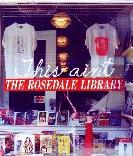
From Fire Island to wet shorts: A ramble begun at This Ain't. |
A big boy in wet red spandex catches me & says "Wish me luck!" I do. There's someone beside him with long blond hair & a dress. "That's a man," spandex confides.
"Yeah," someone else says, "she bowls."
In May Barry had got another ramble, my diversions taking me to Colby's, Chaps, and a very good bookstore on Church Street, This Ain't The Rosedale Library.
"I looked at a lot of new fiction but gave up. Why does every gay novel have to have a boring, rich New Yorker with a share on Fire Island?" My own boredom led to The 457, "probably dead," I said, "but worth a try."
- At the door I hear a voice inside, amplified, announcing a prize draw. I stop. On the door is a poster for their Mother's Day celebration. Really? Should I? Maybe for the wet shorts contest. OK.
Inside it's not dead but packed, decked out in streamers and balloons. It's the baseball crowd, The 457's team. I get a beer, go upstairs to the deck -- and it's packed, too. I see the sign up board for the wet shorts contest: one name.
Then a cute boy I've seen before (at one of ACT's focus groups, so I'm not supposed to let on) comes over and puts his name up. Then a few more. It's on at 6:30. May as well wait.
6:30. There are a handful of contestants out on the deck, a hose to wet them down, scattered sun -- and a temperature of about 8 degrees C. They are in T shirts, spandex bicycle shorts, Paul (the focus group cutie) in a jockstrap. One by one the MC (a man with a black cowboy hat, a campy patter and a laugh right out of a horror movie) introduces them. They stand on the bench, get hosed down, splashed in the face, sprayed in the crotch -- "Turn around!" the crowd laughs and they get it in the ass. All brave sports.
They retreat to towels and shiver as Miss Holly Wood is introduced. She does something slow and romantic -- and the whole deck stills. They look at her with an intensity even the half dressed boys didn't get. Some people, even some of the shivering contestants, mouth the words. Amazing the appeal of drag. Or, perhaps more to the point, romance.
It's too cold now on the deck for announcement of the winners, so we all go back downstairs, very crowded. Someone snags a black streamer and it drifts down, catching one of the judges, an older gent, right across the neck. He does a quick take, glances at his watch and says: "And it's not even time for Murder, She Wrote!"
One of the contestants, a big boy in nothing but wet red spandex, catches me and says "Wish me luck!" I do. There's a small person beside him with long blond hair and a dress. "That's a man," spandex confides. "Yeah," someone else says, "she bowls."
People have caught more downed streamers and are making neckties out of them. A blond at a nearby table is taking flyers handed out for another baseball benefit and making them into paper airplanes. He sails one over the bar.
The winners are announced. Red spandex wins. Jockstrap Paul comes in third. I get off my stool. On the way out I pick up a paper plane and when I'm squeezing through the crowd past the blond who made it, I give him a smile and toss it at him. He likes that. I go.
***
|
You're the top!
Thanks to Dean & Steve for the pix. |

You are here. Well, in thought anyway. |
Mail came through a slot in my door, usually around 1 pm. I was so eager for letters from Barry that I'd stay home 'til then, even later. Sometimes, if there'd been none for a while, I'd stand right by the door. And wait.
From late August, nothing came for five weeks.
Barry and I had gone to The 457 while he was here in March, to Trax once and to a place just up the street at 467 Church that he'd never seen before.
Woody's had opened in July 1989, site of a former and not gay piano bar called Jingles. Barry didn't much liked it: too done up; too polite. I didn't much either. Once there with Kevin Orr he sensed I was antsy (it hadn't been a good day). "Are you alright?" he asked. "No! I want to get out of here. It's just a waste of time."
For me Woody's would have been a total waste if not for its staff, its owner, and what they made of what might have been just another bar. The manager was Dean Odorico -- Dean the Dream -- whose gay career had already been a long one.
Coming to Toronto in the late '70s, at the age of 17 and from a very small town, he found work (for a day) at The Hot Tub Club, then at the Roman Sauna and then for Janko Naglic, managing The 457 and The Barn.
From those places Dean had brought along many bartenders and busboys long faithful to him -- as they would remain: for a gay bar Woody's would have remarkably low staff turnover.
Steve Clegg, my erstwhile almost roommate, was one of them. So was Karey Webb, that sweet boy Michael Wade had once roomed with; Calvin Pollock, once Mr Barn Leather; handsome blond Brandon Barre; Jimmy Hinks, with the no nonsense charm of his native Newfoundland; beanstalk Brent Hogan.
The first ad for Woody's promoted these boys as much as the bar, showing nine of them sitting on its steps, four others in separate shots. Later there would be a few girls, too, and annual contests in which you could win a date with the boy or girl of your choice.
The man smart enough to hire Dean -- suggested to him by Xtra's ad rep Colin Brownlee, also a candidate at the time -- was Alex Korn, son of the owner of a few suburban strip clubs.
His gay bar career (Alex not gay) had begun in 1983, when he and Ward Hagar (who was, and worked at Boots), opened Chaps. Ward died of AIDS a year later and soon Alex was caught up in AIDS work.
In January 1988 Chaps began doing benefits for the Toronto People with AIDS Foundation, raising more than $14,000 by September of that year and much more beyond.
Later Alex would open Ward's Retreat, named for Ward Hagar, as a rural getaway for people with HIV / AIDS. His wife Dorry did holistic health work with the PWA Foundation and the AIDS Committee of Toronto, and would do it for years.
When Alex opened Woody's, having done very well by Chaps, he wanted to make it a real neighbourhood bar, giving back even more to the community. On its first night there was a donation basket for ACT, Alex himself matching whatever patrons gave.
Soon after that Dean instituted "Staff Nights," usually the first Monday of each month, when all staff tips were donated to ACT -- with Alex matching them again. By 1999, total contributions had reached more than $150,000.
Woody's became Toronto's most popular gay bar of all time (so far). Its beer sales would exceed those of any other gay venue, ranking it among the top two or three bars in the entire city. In the 1999 Pink Toronto Awards, an annual event for some years, Woody's wound be named (not for the first time) Outstanding Business, Outstanding Bar, and Outstanding Business Fundraiser for the community.
Alex Korn was given an Honourary Lifetime Achievement Award, Dean Odorico hailed for Outstanding Contribution to the Men's Community by an Individual -- an honour he has received more often than his genial modesty allows him to recall. (He once beat me for it -- but then I didn't even know I'd been nominated until I read it in Xtra.)
Woody's became what Buddy's had been: the bar most caught up in the life of the community. Dean the Dream became, unofficially if deservedly, the Mayor of Church Street.
For that, I can put up with a crowd occasionally too polite.
***
Jane Rule had again offered me the gift of a trip to Galiano. She thought I might like to be in Vancouver in early August for the 1990 Gay Games, but I found that prospect more daunting than enticing.
Potential guests at Jane's sounded more fun: Joan Nestle, whom I hadn't seen since the Sex and the State conference in 1985; and Barbara Grier, whom I'd never met. She's a lesbian landmark, running Naiad Press, the only publisher to keep all of Jane's work in print, and last editor of The Ladder, the pioneering lesbian journal born in 1953 and surviving to 1972.
In the end neither Joan nor Barbara made it, but Judy Baca and Pat Hines did, Judy a fierce Latina painter doing huge murals around Los Angeles, Pat her lover. Judy had just been to Moscow, from which after a run in with officialdom she'd had to flee by train, spiriting her work out with her.
There was also a great three year old at the pool who swam like an otter -- jumping in, sailing under, coming up for a gasp and then going down again. Jane called him Mighty Mouse and the routine "his unique drowning style." We all had a wonderful time, as ever on Galiano.
I skipped Vancouver almost entirely on this trip, on the way out taking a bus directly from the airport to the Gulf Island ferry at Tsawwassen, getting back to the city a week later only three hours before my flight home. That gave me just enough time to see the people I most wanted to see: Terry Farley and Billy Sutherland.
They had become close friends there, living in the same West End highrise, Billy working in administration at St Paul's Hospital. We had lunch at the Sylvia Hotel with its wonderful view of English Bay, my view of Billy and Terry wonderful too, both happy and relaxed.
***
I came home to two letters from Barry and a postcard of Mt Fuji -- sent from atop Mt Fuji just to say he'd thought of me there. Things at work had been getting rough for him, another year there maybe in doubt, and he'd been having lousy luck in Tokyo's tiny gay bars.
But his next letter began: "News flash! It finally happened! I got my kind of Laid!" His name was Chris, a 22 year old sailor from Tennessee. With him, Barr said, he occasionally had to "slip out of the leering old man suit, slip into the sociologist kindly man mode." Chris was likely to be shipped off soon to the Persian Gulf, then heating up.
Barry also wrote: "You know, despite all this I think I am getting back into women. I even went so far as to call one up to ask her for a date, but in the end I chickened out. Oh well, life is full of twists and turns, isn't it?"
This wasn't a complete surprise. I'd never thought of Barry (nor, I think, he of himself) as bisexual, though he'd had an affair with a woman in his home town on escapes there from Wally in St John's. And, to cite Esther Newton and Shirley Walton's categories, Barry's erotic persona, role, and favoured erotic acts might from time to time easily outweigh mere sexual orientation.
Mail in my building was delivered not to boxes in the lobby but through slots in each apartment door. It usually came around 1 pm. I was so eager for letters from Barry that I took to staying home until then, even later, waiting to hear the clatter of that slot and the slap of things on the floor, waiting for a brown envelope with a blue 100 yen stamp on it.
If it got to be well after 1:00 and I thought a letter due (usually every two weeks or so) I would stand right by the door. And wait. From late August, nothing came for five weeks.
***
Then on October 5 there were six letters in one big envelope, four dated in August, the others September 23 and 24. He apologized for having taken so long to send them.
"Do forgive me, but my three concurrent sex affairs tend to keep me hopping." They were Chris, the sailor; a Japanese woman; and a French model. (Later there would be a fourth.) He said he was not in love.
- Chris and the Japanese woman have decided that they have fallen / are falling in love with me. Me? I just want to fuck! ... The French lady, 32, is haute monde. Her friends are artists, models and attitude! Just my cup of tea, right? Still any hole in a storm, right? Right!
All were signed, as usual, with love. The second last one ended: "Yes, I still love you. Always will, and that's your cross to bear!" But his macho pig defence I could not bear. I wrote him back:
- When I see you caring about someone else -- much as that might hurt at first -- I can still say, yes, he's the man I know him to be, hope he always will be, generous and open and warm and good. What I get in this letter is: NOT IN LOVE! Is this to reassure me? Odd that it doesn't. In a way I wish you were.
And then I think: no, I don't believe it -- he is, a little anyway, cares about these people at least. Better to believe that than to accept all that cheap fucking (literally fucking) cynicism: "Any hole in a storm, right? Right!"
Will you please cut that shit? OK, so you're not in love and you like getting laid. Fine. But if your defence is that they're all just holes -- then you're just a prick. A heartless exploitative prick. You're not. So stop playing it.
My letter went on much longer. I said at the end: "It's so hard and sad talking to you like this. It's depressing and condescending -- and, saddest of all, necessary."
I clearly hit a nerve. He wrote back on October 15: "Yes, your letter was condescending and, saddest of all, unnecessary. Is there a border something that someone forgot to tell me about? If there is don't tell me. I prefer not to know."
As for our love: "It's over. It has been over for quite a while. I'll always love you and respect you as a friend, but dreaming about beyond -- there is no beyond." It was signed, simply "Barr."
I wrote back saying I was not dreaming about beyond. I was trying not to wait anymore, and a good thing, that. His next letter came in January 1991, a short one, mostly to send a change of address. But before that: "Everyone is gone. Have been for over a month -- no lectures, please. Not everyone -- Dinos [affair number 4] is still here. In fact I'm moving I'm with him for a while -- no lectures, please."
I didn't lecture. And, with more difficulty, I did learn not to wait. Barry had said he'd be in Toronto in March 1991 on his way back to St John's. But even for that, I didn't wait.
***

Rebels' rest: Monument erected by "sympathizers & friends" in 1893 to Samuel Lount & Peter Matthews, hanged heros of the Rebellion of 1837 (for which see a few bits of Canadiana in Losers (who sometimes win). For me The Necropolis was full of history; for Mike Robért, too much death. |
Mike's gifts couldn't be counted on by date or time. He called one day; I said I had to go to work. "Awww, reelly?" "OK Mike," I said, "what do you want?" "Well, maybe tea." So tea it was.
Jane Rule, having heard too much of Barry, of deaths (more than I've reported here) and various messes at work, wrote in a letter around this time: "I wish you had a good playmate about with you now, someone to coax you into walks, silly movies, a beer. ... I order you to find such a fellow at once."
I wrote back saying she had made me laugh out loud. "A very smart order," I said, "but a tall one too. In fact I have found one, a very tall one: 6'5". But I have to play carefully: it's Mike Robért."
My caution with Mike was not about his physical state. He was on AZT now, doing well, gaining weight and feeling so good that he wanted to go back to work.
It was about my response to him. He dropped in a lot at the office. "You work too hard! You need a hug!" I loved that, loved his voice especially, big and boyish gamin at once. It was easy to love Mike: everyone did and he accepted it as simply his due, his ego so big it might have been insufferable had he not carried it with such radiant ease.
In September he invited me to his birthday party. His mother was there, so devout she unnerved me -- until she undercut suspected sanctimony. Her four children had been adopted. Mike said: "Terry looked Mexican, Chris and Mark were blond, and I was just very good looking." Taking them all for haircuts once, the barber had noted how little alike they were. "Well," she said, "they all had different fathers."
Mike was unquestionably very good looking, so much so that he'd once played at being a model, for a friend with a studio and just for a few hours. At his apartment he showed me those shots. The man in them was so engaging, so aware of both what he was playing and that he could play it very well -- so beautiful -- that I had to stop myself wanting that man when the real man was sitting right there beside me.
I did love Mike, but was wary of falling in love with him. "Call me at nine!" he'd yell leaving the office. I would call -- and get his tape. Even that was a pleasure, that voice singing himself happy birthday or saying: "Hey, come on! Leave me a really good message for a change!"
In any practical sense he was utterly unreliable. But, as I once told Jane, having taken some time to come up with the line: "Saying Mike is unreliable is like complaining that a rosebush can't type."
***
Mike's true gifts were of a different order entirely, never to be counted on by time or date but wondrous whenever he chose to give them.
Once he called wanting to take a walk and feed squirrels. We got peanuts, wandered finally to The Necropolis, for me rich with history but for Mike too full of death. We came upon a huge pile of leaves. "Hold this," Mike said, handing me his bag of nuts -- and took a running leap head first into that pile. He climbed out covered in leaves, his big face lit up. "That felt great!"
Once in October he called and we talked until I said I had to go to work. "Awww, reelly?" "OK Mike," I said, "what do you want?" "Well, maybe tea." So I went over and found him in pyjamas, his hair a fright, recovering from surgery for an abdominal abscess. He padded around moaning, making tea, spouting in his usual fashion words he'd insist were English -- muldane, quandrum, jollical -- loving a silly fight about whether they were.
Later he called to report being at a People With AIDS dinner. "God! Everything was AIDS. The plastic cups and plastic forks had AIDS, the dog had AIDS, the turkey had AIDS." But he was feeling jollical, planning to recover in his "lava pit" -- a bath with Mr Bubble and red food colouring.
He was at my place one night, I a mess about Barry and Mike messy too about a new, unidentified itchy condition. We sat drinking scotch, knee to knee, and talked: about him, about me -- which meant about Barr. I put my head on his knees and he stroked my hair. "Barry loves you," he said. "He just has things to figure out. Wait. Trust."
I had never touched him so much, so easily. Later he was leaning into me; I caressing his head. "You can stay if you want," I said. "Let me think about that." In the end he thought not. "It's OK," he said, "I'm just not ready right now."
He headed out to his bicycle, having had enough to drink that I asked him to call me when he got home. He did. I told him he'd left his sweater. He called back the next night and asked, "Did I leave my sweater?"
***
On that night, Mike had said he would take care of me. Practically speaking that was absurd, but in larger ways I believed him. What he'd said, exactly, was: "If you fall, I'll catch you."
- Sunday, October 14, 1990, to Neil Bartlett:
Thanks so much for Ready to Catch Him Should He Fall. It arrived on Thursday, it was all read by Saturday and since then I've reread twice my favourite bits, the ones about The Bar and Mother in The Bar. Not that Boy isn't a wonder, not that the structure of the whole thing isn't, too -- but I relished so much the place.
I've always wanted someone finally to capture it, what it is like; why the place, those places, are such wondrous, ordinary life. Ours. And you have.
It was the first Neil and I had been in touch for a year. So he, too, got to hear about too many deaths, wondrous men in them and despite them, and of course about Mike Robért and his suddenly apt line.
For Christmas Neil sent an image of an ornate rococo stage with great swags of drapery, rocky cliffs flanking it out front, as if the audience. Under the proscenium was a bit copied from a page of The Bible, Chapter XIII but of which book I don't know:
-
"1. Let brotherly love continue.
"2. Be not forgetful to entertain strangers; for thereby some have entertained angels unawares."
See more Woody's boys below.
Go on to 1991: Jan-May / Go back to Contents
This page: http://www.rbebout.com/bar/1990b.htm
December 1999 / Last revised: October 7, 2001
Rick Bébout © 2001 / rick@rbebout.com
